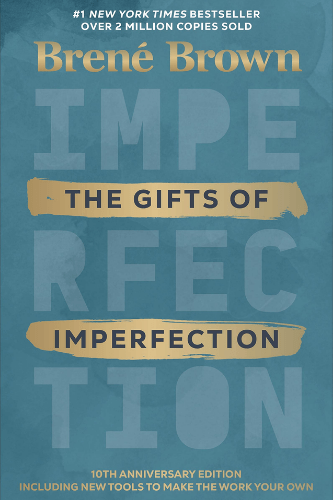“The Gift of Imperfection” illustrates why loving who we are requires boldness, compassion, and a profound connection. Brown’s book is more than just theoretical advice; it also includes practical guideposts for living completely, as well as everyday activities to help us along the way. It’s also about going to bed at night knowing that our flaws, faults, and concerns have been addressed. Brown believes that every human being, flaws and all, is capable of courage and worthy of love and belonging. here you can download the book The Gift of Imperfection pdf
| Name | The Gift of Imperfection |
| Author | Brené Brown |
| Publication | Vermilion |
| Language | English |
| Pages | 240 |
Also Download: Alibaba: The House that Jack Ma Built | Invent and Wander: The Collected Writings of Jeff Bezos
Professor, best-selling author, public speaker, and podcaster Brené Brown has a unique perspective on current events. So many works are dedicated to loving, belonging, and merit as ideas and values. Brown’s approach is unique in that it is based on her own shame study. Despite the fact that she is a researcher, Brown describes herself as a “story collector.” In this way, she’s been able to investigate many people’s struggles and thoughts regarding shame and vulnerability. She suggests specific changes we should do in order to engage in life on an equal footing. To put it another way, to really live.
Summary of The Gift of imperfection
Three Opinions on Shame: Brené Brown asserts that she is confident of three things concerning shame. The first is that we all carry it about with us all of the time. Shame, to put it another way, is universal. The problem is that the less we discuss it, the more power it has over us. Shame grows in the presence of secrecy, silence, and criticism.
Brown also feels that shame and guilt are not synonymous. While guilt makes us feel as if we’ve done something wrong, shame shifts the focus away from the wrongdoing and onto the person. It makes us feel terrible, to put it another way. Shame is concerned with our core identity, while guilt is concerned with our actions. Although guilt is a dreadful emotion, it may be beneficial if we use it to identify areas where we can grow and improve. Shame is almost always negative.
Shame is caused by the fear of being not included with others. We feel that if others knew or saw anything about us, it would make us unlovable and unworthy of belonging. As a consequence, shame is associated with a sense of overwhelming vulnerability.
An Investigation into Vulnerability: Vulnerability may be defined as the willingness to say “I love you” to others and the will to try anything with no guarantees of success. Brown was able to recognize her shortcomings after going through a personal journey. This journey has been described by her as a “mini-breakdown slash spiritual revelation.”
As a consequence of her voyage, she erected ten guideposts along the road that represent the path to a wholehearted existence. Some of these characteristics include authenticity, compassion, a resilient spirit, gratitude and joy, faith, creativity, meaningful work, relaxation and rest, a sense of peace and calm, and remembering to laugh and dance along the way. Each guidepost is a two-sided coin. For example, in order to encourage authenticity, we must be willing to let go of our fear of what others may think. To foster compassion, we must let go of perfectionism and acquire resilience. We must overcome the desire to numb ourselves in order to escape sorrow.
Develop your own uniqueness and let go of other people’s opinions: Authenticity is a combination of everyday choices that we make. It’s how we present ourselves, as well as how genuine and honest we are. Making the choice to be genuine is not simple. The key to authenticity is balancing the impulse to be honest while not making others feel uncomfortable. It’s also about being able to express ourselves without hurting or offending others. It’s having the confidence to differ without being violent or arrogant. Finally, it’s a difficult balancing act, and our actions may leave us feeling both hopeful and exhausted.
Authenticity, no matter how we play it, is never a safe bet, and we’ll have to choose between being real and being loved at times. On the other side, sacrificing who we are for the sake of what others think isn’t worth it. If we play it safe, we risk experiencing unpleasant feelings like anxiety, despair, and rage. According to Brené Brown, taking a stand is a sacred act.
Unlocking one’s individuality, however, takes bravery. Authenticity necessitates audacity. “To announce one’s opinions with one’s whole heart” was the original definition of courage. Courage has taken on a more heroic tone. Brown claims that if we revert to the word’s original meaning, we will be able to live fully. Because we have the bravery to be vulnerable, we may be vulnerable and face disappointment. Even if there’s a chance things won’t turn out the way we’d intended, boldness encourages us to have high expectations. Brown also realized that downplaying the exciting events would not help the pain go away if they do not occur. However, if this occurs, it degrades the whole experience. The beauty of boldness is how quickly it spreads.
Brown claims that part of the anatomy of authenticity is having the guts to be imperfect. As a consequence, in order to grow more honest and brave, we must impose constraints and allow ourselves to be exposed. We also need to build more compassion, which comes from a place of genuine self-acceptance and acceptance of the fact that we’re all a mix of strengths and flaws. Finally, we must cultivate a sense of belonging and connection that can only happen when we believe we are enough, which necessitates the cultivation of self-compassion.
Cultivate compassion through letting go of perfectionism: Brené Brown is a recovering perfectionist who is working on being a “good-enoughist.” With this in mind, she advises that we focus on improving ourselves rather than worrying about what others think of us.
How often do you feel self-conscious about your appearance? Many of us are self-conscious about how we look, and we often believe that being different makes us unworthy of love and belonging. Brown promotes “healthy striving talk,” or doing things for one’s own advantage rather than for the benefit of others. As a consequence, in order to overcome perfectionism, we must build self-compassion.
Perfectionism tries to convince us that if we look and act perfect, the pain of blame, criticism, and humiliation would be lessened or avoided. Perfectionism serves as a defense mechanism. It is also not synonymous with self-improvement. At its core, perfectionism is motivated by a desire to be accepted and approved. We believe that our successes determine our self-worth.
When we’re dealing with feelings of inadequacy, and needed to be more self-aware. We can only be present with our own darkness if we can also be present with the darkness of others, according to Brené Brown. As a consequence, compassion becomes genuine when we recognize our shared humanity. It requires acknowledging that feelings of personal inadequacy are a normal aspect of life and that we all go through them.
Brown’s message of compassion is that we should all be more aware of how we treat ourselves. She also advocates for a balanced response to painful emotions, one that is neither overdone nor suppressed. Getting attentive requires us to stop engaging with our thoughts and emotions in order to avoid being swept away by them.
Resilient Spirit development: Brown made another shocking discovery: selective numbing does not exist. We numb the light in the same way that we numb the dark. When we strive to alleviate the pain of loss and vulnerability, we unknowingly decrease our joy, presence, and happiness.
stay alert and honest while overloaded: Spirituality is not just about religion or theology – it’s about knowing that we are all irrevocably linked to one another by a power greater than ourselves. Having a deep understanding of spirituality can help us create hope, exercise critical awareness, and let go of numbness. We can keep going when we have a sense of purpose and perspective, even when we are unhappy or in pain.







